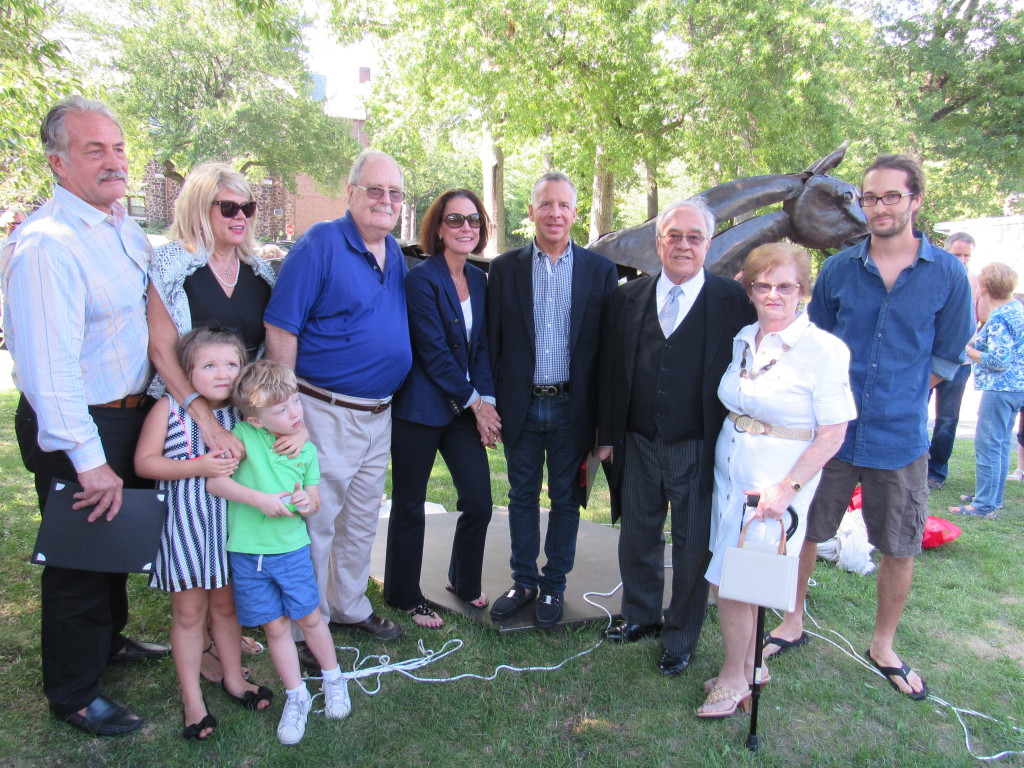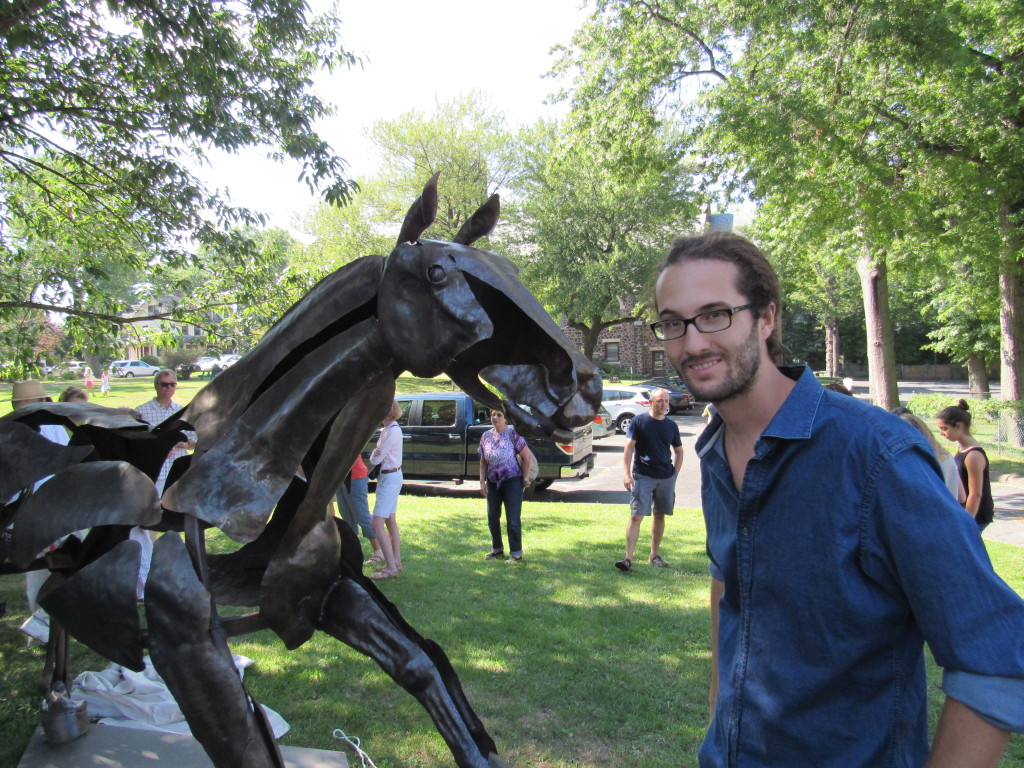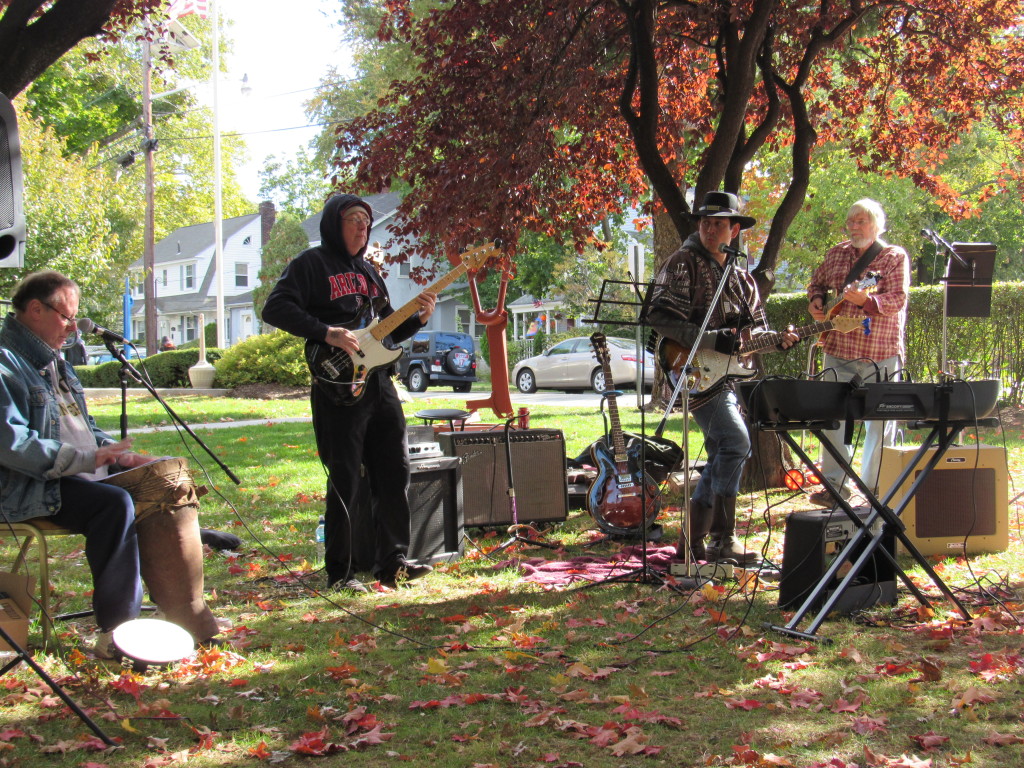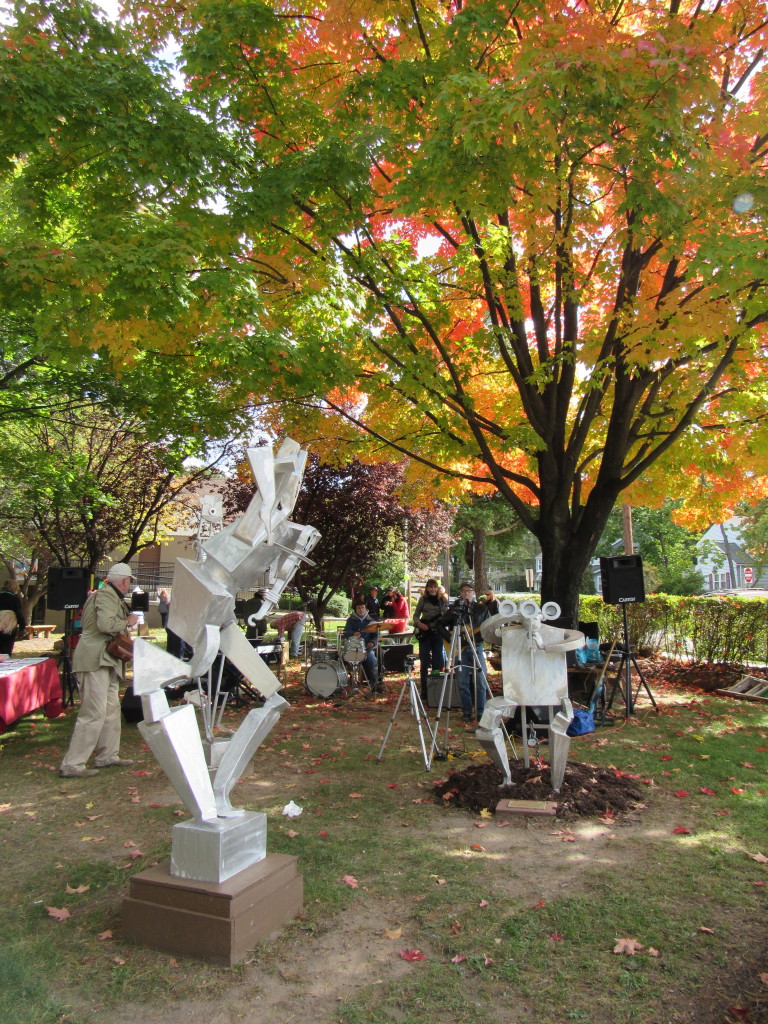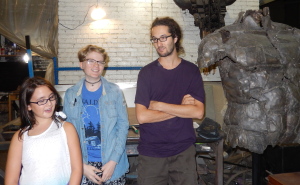 Adrian Landon’s short story contest winners had the opportunity to meet the maker of their inspirational Dung beetles in person and visit his studio in Brooklyn N.Y. Ilta Rinne (under 18 winner) and Mika Cullen (honorable mention for her cartoon) were able to see first hand where the artist works and creates.
Adrian Landon’s short story contest winners had the opportunity to meet the maker of their inspirational Dung beetles in person and visit his studio in Brooklyn N.Y. Ilta Rinne (under 18 winner) and Mika Cullen (honorable mention for her cartoon) were able to see first hand where the artist works and creates.
Adrian Landon is well known for his horse sculptures. His latest creation, one 4 foot dung beetle and recycle ball and a smaller copy, highlighting our need to protect the environment was located at Station Parkway. The sculptures have now departed Leonia. Sculpture for Leonia held a short story competition that announced their arrival. Writers could be as creative as they liked. Please find below the result of this inspiring contest.
MEET OUR AMAZING WINNERS (this competition is now closed)
MITCHELL DELMAR (Over 18)
About the Author: Mitchell Delmar grew up in Leonia. “I saw the world change through the prism of small-town eyes: A president shot. A moon-landing. A war. Woodstock. I write essays and short stories and post them online for anyone who cares to stop for a moment and read. Grandmother was a best-selling author, and I enjoy the idea that I might have inherited a little bit of her ability. My mother is still a resident of Leonia and I’m in town on weekends. My current residence is Long Branch – down the shore – where I enjoy my other life-long connection with the nearby, ever-engaging Atlantic.”
WHEN DAY IS DUNG
It’s not as unpleasant as it might sound, this life. Yes, yes, it’s all to do with excrement, as it were, but I’ll tell you this, you’ll never want for it. No sir, not a bit. There’s always food enough for the little ones, plus me and the missus besides. A fair dinner, some dung over your head and steady work is all one can really ask for. That’s how I see it.
My father was a Roller, and his father before him, so it was only fitting I carry on and join the Rollers, too. Local 472. Oh, yes, we’re union. You’ve got your Rollers, your Dwellers and your Tunnelers. “In Dung There Is Union,” that’s our motto. It’s honest work and, truth be told, the world would be even further up to its ears in excrement if it weren’t for me and my chappies doing the heavy lifting. As it were.
There’s hierarchy everywhere, no news there. Me, I’m happy in my place; rolling my ball of dung, the missus, my Gwen, ever-faithful, taking up the rear. I never wanted to be a Tunneler and certainly not a Dweller. Just not my cup, either having to haul my work underground or living amongst it. Honorable work, mind you, but Rollers don’t mix with Tunnelers, nor Dwellers either for that matter. It’s not that we’re elitist – they’re just not our sort. A different crowd altogether.
Now to the point – my eldest, Ernie, has been making noise about moving out, rolling his own way. I’ve nothing against the notion of it. Every beetle grows up sometime, and when Gwen and I began our brood we always knew the day would come when the offspring would leave and find a heap to call their own. Only natural. The damnable thing is, Ernie has taken up with a Dweller! A young thing with a shiny pronotum and a mid-leg that caught young Ernie’s fancy. I ask, how is THAT relationship ever to survive?
I can see it now: He’ll be out rolling all day, maybe two shifts at times, and what will she be doing? I’ll tell you what she’ll be doing – she’ll be dwelling, THAT’S what she’ll be doing. Sitting around, eating all day, her legs up!
I’ve nothing against her as a beetle, per se, but we’re discussing fundamental beliefs here, passed down through countless generations, entrusted by our forbearers for continuance. Breaking with tradition can be detrimental to our very existence! It’s no trifling matter. Dung doesn’t move itself, you know.
Now look, I’m a pragmatist. I understand times change. After all, who’s to say what’s “right” in this crazy, dung-filled world? Just because a certain way of life was right for me and my father – and his father before him – doesn’t necessarily mean it’s right for Ernie.
Change can be hard to accept. It can feel as though everything you’ve worked for and believed in was for naught, but that’s negative thinking and I won’t be party to it. It only places one at a disadvantage in the modern world. You have to roll with the times.
Mind you, it’s not for me that I worry – I’ve lived my cycle – it’s for our offspring. They’ve yet to learn the lessons of the past. Too busy living in the moment, their heads in the dung. Perhaps that’s the natural order of things. What these young beetles don’t understand is that a bright future’s no sure thing. It wasn’t so long ago that our kind suffered deprivation on a huge scale. The dung lines. The riots. Don’t think it couldn’t happen again – that’s a classic lesson of history – you must keep one antennae in the future and one in the past. “Times may change but beetles don’t,” my father used to say. There’s truth in that.
You could work yourself into a right state over all the uncertainty. Thank goodness for the occasional moment of clarity. The other day, me and the missus were trying our best to roll a large ball up a steep hill. We were nearly to the top when, exhausted, I lost a handle on it and down it rolled to the bottom. “Dung!” I cried. Dutifully, we retrieved our ball and began the laborious process anew, only to repeat the same experience again and again! This went on all day, if you can imagine. Our energy and patience strained to the breaking point. Frustrating beyond words.
Towards sunset, we sat at the bottom of the hill beside our ball, absolutely gutted. I turned to the ball, about to hurl some epithet in my misery, when out of the blue I started to laugh. The missus looked at me as though I’d gone mad and I said, “Don’t you see? We’re being taught a lesson!”
She looked momentarily gobsmacked and then whooped with laughter, “Crikey, you’re right! Look at the two of us! All worked up and for what?”
I shook my head in puzzlement, “I don’t know, Gwen, but I do know a fool’s errand when I see one.” I extended my leg to help her up. “Come on, my lovely.” We both stood and walked away from our day’s toil. There’s always tomorrow.
Life’s as simple as you make it. It’s only dung, after all. There’s truth in that, as well.
ILTA RINNE (Under 18)
About the Author: Ilta Rinne is a senior at Leonia High School who hopes to pursue writing as a career. Ilta has had a love for writing since the second grade and recently completed the first draft of a science fiction novel. Ilta also enjoys art, botany, and film.
SIX LEGS STRONG
It was winter and the Hive Theatre was abuzz with people. Everyone found a seat. The crickets and katydids warmed up in the orchestra pit. Mae, trailing close behind her mother, felt a tickle in her clenched fists as they sat down and the music started up.
Mae recognized the mayor as he crossed the stage in long strides to the podium. Wearing a silk evening tux and a proud smile, he cleared his throat. The wings of the crickets and the katydids stilled.
“Welcome to the One Hundred Year Celebration,” the mayor announced. The crowd clapped and Mae’s mother clapped, but Mae kept her hands in her pockets. “Thank you, thank you. I am so very pleased to be here, commemorating how far we have come and the people that have led us to this day. Ladies and gentlemen, place yourself one hundred years in the past. Just for a minute. Picture a world weighed down by its own waste. A world suffocating on tainted air. A world in desperate need for change. Now, come back to the present and look around you with new eyes,” the mayor said, reading his words off paper that would biodegrade in a matter of hours. He gave the audience a moment to truly look.
All the honeycomb balconies that lined the walls were filled with people suddenly in awe. Mae met Shiva’s gaze. Both of them were on the floor level, sitting with their parents beside them. But the back door wasn’t too far away. And the rain had stopped as they’d hoped. The girls nodded at each other.
Mae had spent the better part of the week rereading all the books she owned. Even the ones she kept some under her mattress, though they were blanketed in mold. Between the fungi-infested front and back were pages upon pages of detailed diagrams. Clocks and carburetors and convection ovens. She was ready to see it all up close. She was ready for it to be real. Mae could hardly sit still.
“We must be grateful,” the mayor continued. “We were brought out of darkness into this new era. We have the writers of the Improvement Through Insects Proposal to thank. We have the scientists behind the Genetic Enhancement of Insects Project to thank. And of course, we have all of you to thank. Without you citizens—”
The mayor droned on and on, but as Mae and Shiva reached the open air outside the theatre, his words blurred into a low, inaudible murmuring. The girls darted behind a well-groomed hedge and Mae loosened her fingers just enough to show Shiva that she had come through with her part of the plan. The fireflies fluttered on her palm. Their light made her skin red and showed off the webbing of her veins.
Shiva pulled out the mason jar she was keeping under her folded coat. The fireflies flew quickly out of Mae’s grip, only tasting a tiny bit of freedom before finding themselves trapped inside the glass container. “Sorry about my sweaty palms,” Mae said, grinning at the little friends she picked up from the garden at dusk. Their tail ends glowed bright, almost blinding. “I can’t believe you used to flicker. ”Shiva rolled her eyes. “How inconvenient.” She slipped her jacket on and held the jar out like a lantern. “Let’s go. Adventure awaits.” Shiva’s cicada skin dress crinkled like dead leaves as they ran, but she loved it anyway. She would strip off the gown before bed tonight and sew it into a skirt. And in the summer, it would feel fresh and new.
The sky hummed with flies the size of human skulls, but the noise fell to the back of her mind. It never stopped, so they hardly noticed. Mae watched the fireflies bounce and hit the jar lid as she told Shiva about Styrofoam.
“That can’t be real,” Shiva scoffed.
“Well, if it is, it’s still here.”
As they reached the west bridge, they fell silent. The thick white mesh beneath their bare feet glimmered like sugar crystals. The gigantic spiders, daytime workers, clung to the sides of the silk tunnel, moving only with the occasional leg twitch. They knew the girls were there and they knew no one was to pass over the bridge without permission and identification. Mae was light on her feet, tiptoeing and breathing through her nose. Shiva dug her toes in because it was soft and spongy. Shiva knew the spiders didn’t care. Spiders don’t often care about anything.
Both girls plucked loose silk strands from the bridge. They were braided and strong. They wound them around their wrists and kept them for later. On the other side of the bridge, Mae and Shiva saw the bees were zipping around on their morning route, going from flower to flower in tedious order. They were massive, bigger than a full-grown man and fatter, too. Mae and Shiva ogled at the bees at work, legs thick with pollen.
“Did you know that flowers used to die for months at a time? For all of winter, the earth would just be bare; can you even believe that?” Mae asked her. She cupped a daisy in both hands and it smelled like spring, even though it wasn’t. “How do you know about all this stuff?” Shiva asked, her pent-up question finally coming out. She sighed. “How many books have you stolen?”
Mae almost blushed. “I don’t know.”
“You don’t know because you lost count?” Mae’s bed at home was a good few inches higher than it used to be, propped up with a plethora of banned novels. “Maybe.” “You shouldn’t be snooping around the school at night like that. The basement’s restricted for a reason. I don’t think they should be keeping all that old clutter around in the first place, but still. If I can catch you in the act, anyone can. And they won’t be so nice about it.”
Mae and Shiva started walking again, heading into the wheat field. Aphids leaped out of the knee-high grain like overjoyed salmon. Mae remembered Shiva’s face when she found her stealing. Mae’s chest was unusually square-shaped with the last copy of Exploring A Concrete World tucked under her shirt. She thought Shiva would turn her in for sure.
“The pre-2100 years should be kept simple. It was bad and now it’s better. That’s it,” Shiva spoke up. “Simple.”
Mae shook her head. “Where’s your curiosity?”
“Under control.”
“But there’s so much to know. Junkyards and smoke and bricks.”
“See? That sounds terrible,” Shiva interrupted. “Let’s stop talking about it.”
The grass thinned like a receding hairline. The earth dropped in front of them and they could hear pebbles dribble down to the valley. The girls stopped before they fell right in. Shiva sat on the edge of the cliff with the fireflies beside her. Her legs swung in the open air. “Why’d you want to come with me, then?” Mae couldn’t help but wonder. “Why do you want to see the Ravine?”
“I needed something to do.” Shiva turned to face the edge of the cliff. She held onto a crooked branch and fastened the plait of spider silk to it. Keeping the other end around her wrist, she started climbing down into the gorge. Mae went after her eagerly with the fireflies stowed under her arm, safely hooked onto the top of the ledge, as well. She looked down and the world undulated. Her sight got fuzzy at the edges and her voice came out shakily. “That’s it?”
“That’s it,” she told her. It wasn’t long before Shiva jumped a few feet and was on the ground. There was a harsh, horrible growl in her ear. She jerked away and saw the fly, hovering inches from her face. Shiva clapped. Her hands were closed around it and she could feel the sticky, sappy blood on her skin. Mae landed next to her, but so dumbfounded by the sight of the Ravine she didn’t notice a thing.
Shiva wiped her hands on her thighs. “We actually made it.” Mae could hardly believe it either. The world smelled like rust. The dung beetles roamed, not working at this hour, but restless. The valley had strict rows of balls, one after another, all metal and wiring. And beyond that was the torn-down city, still half-alive. It was the first time the girls had seen ash. The beetles would take the skyscrapers down brick by brick and roll the remains into compact spheres. The beetles made the balls about as big as themselves, both at least ten feet tall. A beetle passed by and its antennae turned in the girls’ direction. But it kept going. A shiver flew down Mae’s spine.
Mae’s eyes refocused and her fingers began to trace the shiny red weavings of a crate, one of the items squished into the ball. “Look. I think it’s plastic.” Shiva knelt next to her. She looked at the plastic first without expression, then in disgust. She glared at Mae the same way. But Mae didn’t notice. Or if she did, it hardly bothered her at all. She hopped up and ran to the next hunk of metal scraps and vibrant plastic things. Her eyes grew wide as full moons and her breath drew in quick. This is what museums must’ve felt like, she thought to herself.
Shiva watched her, unimpressed. But Mae just stood there, bewildered and on the verge on tears, as Shiva sighed, wanting this to be over already.“Are you waiting for me to ask what you found? You know you really picked the wrong audience for this,” Shiva said.
“This… is incredible! I can’t believe— I mean, I would’ve never thought—oh wow, I’m crying, aren’t I?”
“Yeah, you are,” Shiva answered, as Mae wiped her tears and nose on her arm. “And over what exactly?”
Mae gasped. “Are you curious?”
“Not now, not ever. But if this is what it takes for you to hurry up, I’ll play along.” It was good enough for Mae. “It’s rust! It’s like metallic moss! It grows when it rains!”
“How’s that even possible?”
But Mae had moved on. It was all almost too much to take in, but she did her best. She wanted to examine every scrunched up artifact with a respectful length of time, keep all the details in her head. But she couldn’t. There was no time for careful gazing. The images just didn’t stick in her head as her eyes swung back and forth. She heard a faint whispering, but she didn’t pay any attention until Shiva was practically shouting.
“Run!” Shiva yelled, following her own instructions as she took off, headed towards the cliff.
Mae felt the antennae sweep over her hair. She gulped, thought suddenly white dry, and looked up at the beast. The dung beetle towered over her. Mae turned around in one spin and the beetle stepped closer. Its legs with jagged points inched threateningly closer. Its head wouldn’t stop twitching. Mae was backed up against the ball, holding in her breath like that could somehow save her.
Mae was moments away from wailing. But through her tears, she could see the bug up close. Its exoskeleton was just as shiny and smooth as the metal it worked with. The antennae were soft on her skin. They nudged her cheek and she couldn’t help but giggle. And even though Mae strongly believed she was seconds away from death, she reached up and pet the beetle, very swiftly, right on its cheek, returning the message. Or, at least, she aimed for the cheek. She wasn’t quite sure where a beetle’s cheek was. While looking, though, she found its eyes.
They looked at each other, the two creatures, and they looked at each other for a long while, until Mae saw Shiva, standing atop of the cliff. Shiva was holding the jar close to her face. The fireflies illuminated her. Shiva was glowing and grinning, really grinning. The beetle backed away from Mae, but didn’t leave her side.
In one swooping gaze over the valley, Mae saw bicycle gears, street lamps with their poles bent and twisted, a couple vehicle hubcaps, and, if she wasn’t just imagining things, she could’ve sworn she saw a real live television. What had smelled like blood or old coins now smelled like home. The beetle’s antennae were moving back and forth between Mae and Shiva.
Shiva waved to her and Mae waved back, even though it was much too dark to see. Shiva disappeared out of sight, bound for home, her home. Standing in the valley with a new friend and an old world, Mae watched the light until it was completely gone.
HONORABLE MENTION POEM
BEETLE MANIA by John Cozzi
Behold the beetle that works the dung
He toils so hard yet is unsung
He rolls his ball of pungent feces
The trademark of his lowly species
Like Sisyphus he rolls his rock
To fulfill his existential lot
But sheer frustration’s not his bent
Just Nature’s need for excrement
This mighty scarab is nothing but
An environmental recycling nut
Whose sole ambition is to endure
And fill this earth with rich manure
Bless you, Beetle, and your kind
Without your work the earth would bind
And soon become so desolate
That life could not proliferate
Roll on and make this world explode
In flaming flora ‘cross the globe
Roll on you gard’ner extraordinaire
And make earth blossom everywhere
EPILOGUE by John Cozzi
Less and less is earth enlaced
With dung and organic waste
Modern litter is man-made
Such waste, alas, does not degrade
Still our beetle strives to collect
The inert bits of man’s neglect
Metals, plastics, and Styrofoam
In bulky spheres it then rolls home
How can this scarab now discover
An alchemy that will recover
Modern, toxic, solid waste
Converting all to fertile paste?
This is a Herculean task,
A challenge to its insect class,
Whose evolutionary bent
Is just recycling excrement
What magic’s left within its genes
That can absorb the toxic streams
And transform this modern dross
Into a life-sustaining force?
Will the beetle lose the fight,
A casualty of eco-blight?
Or can it be a fit ideal
A ‘roll model’ of epic zeal
That modern man can emulate
And so avoid his eco-fate?
Yes, I think this is the plan
Beetle is a trope for man
To sculpt a new paradigm
That resolves earth’s eco-crime
That’s its purpose, I am sure,
To demonstrate life can endure
Neutralizing noxious debris
Enriching earth through sheer espirit














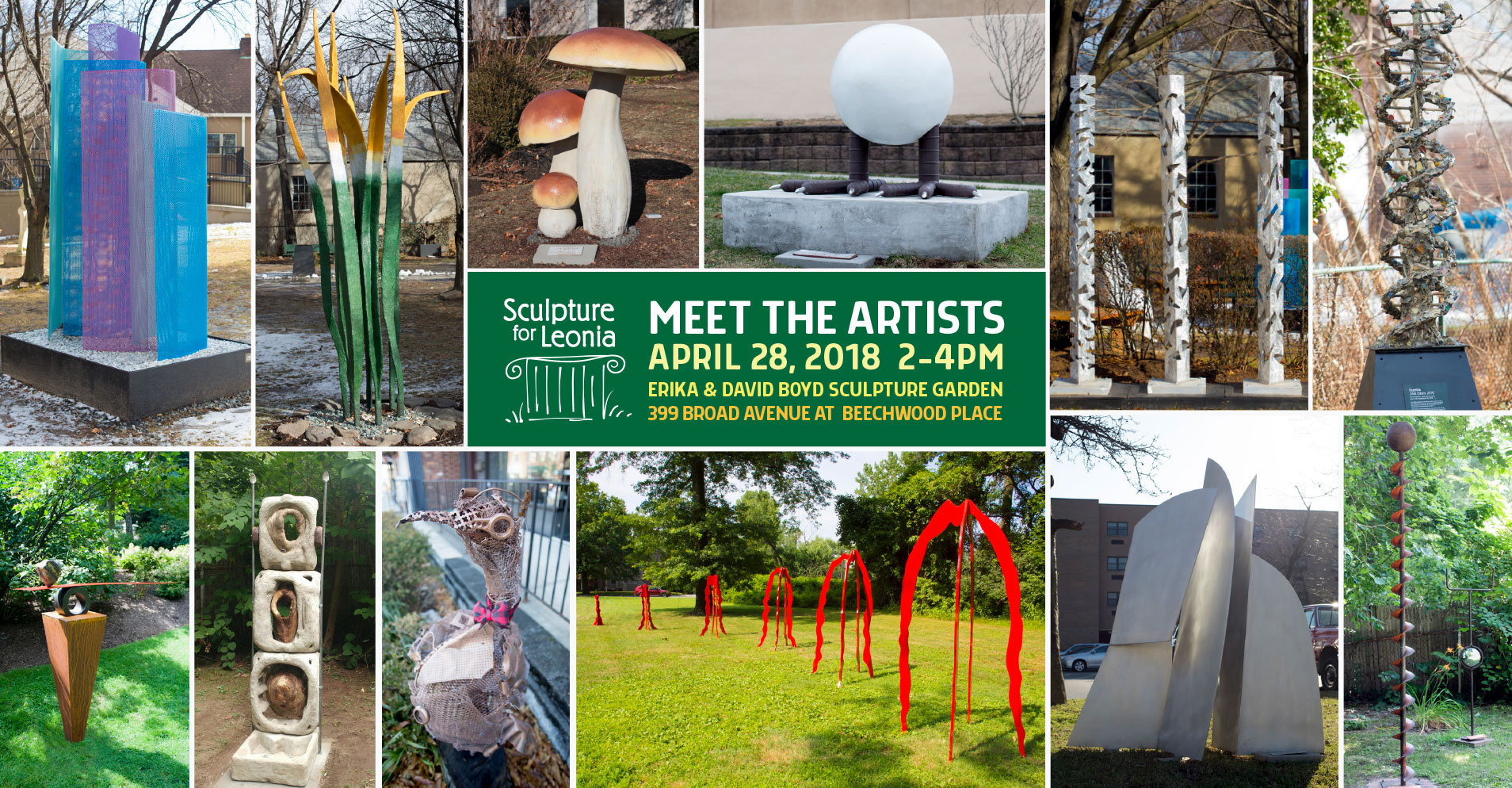




 <
<
